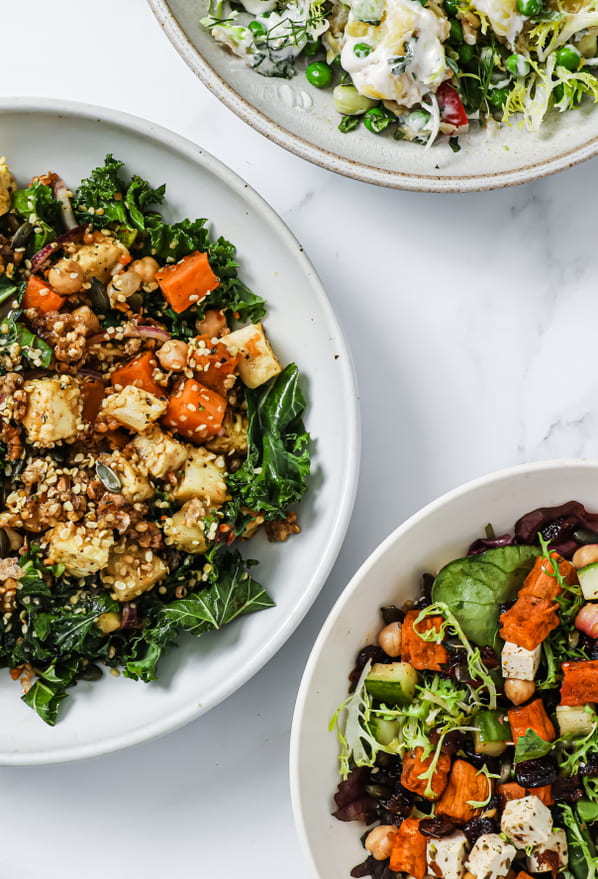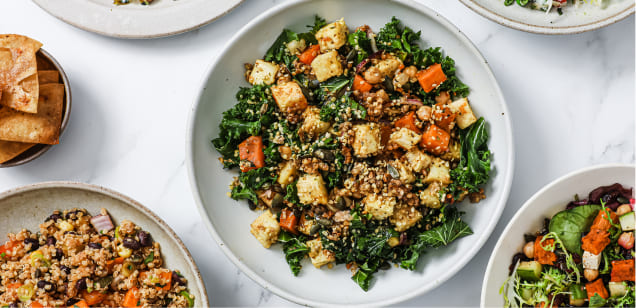The ultimate guide to vegan protein
Tell someone you’re vegan and you’ll likely hear concern about protein intake. Why is this? And do the assumptions surrounding vegan diets being protein deficient hold-up?
If you are already vegan or are considering a plant-based diet, you might have heard or found yourself asking at least one of the following questions: Where do vegans get protein from? How does vegan protein compare to animal-based protein? How much protein do vegans and vegetarians need? Well in this guide, we will cover everything you need to know about protein on a vegan or vegetarian diet.
While it can be easy to laugh off claims that vegans and vegetarians don’t get enough protein, it’s understandable why this might be one of the first things we think about when considering a plant-based diet. Navigating a new lifestyle change can feel like a bit of a minefield. As a culture, we seem to be obsessed with protein, and as such there’s a lot of misinformation available (especially online) when it comes to vegans and their protein intake. But many of these concerns are misplaced. Although protein is certainly an essential nutrient that plays many key roles in the way our bodies function, we do not need as much as we think.
Protein. What is it and why is it important?
Simply put, protein is a component of every cell in the body - from your nails to your hair and skin. Proteins are made up of chemical 'building blocks' called amino acids. Our bodies need a balance of all 22 types of amino acids to function correctly. However, the body cannot produce nine of these acids, known as essential amino acids, and as a result this means they must come from your diet.
So why are they important? Your body uses amino acids to build and repair muscles and bones and to make hormones and enzymes. They can also be used as an energy source. As protein is essential for the growth and repair of the body, it allows for the maintenance of good health. Protein, therefore, helps to keep us feeling fit, strong, and full, providing us with energy to get us through the day.
Where do vegans get protein from?
All plant foods contain protein and are a natural high-quality source too. Spinach contains up to 30 percent protein. Nuts and seeds derive 15 to 25 percent of their calories from protein. Beans, chickpeas, and legumes are another excellent source and all sources of vegetable protein are free of the steroids, growth hormones, and antibiotics usually found in conventionally produced beef, pork, and poultry.
Most plant-based whole foods are excellent sources of protein and other essential nutrients, also often containing fewer calories than animal products. Some plant products, such as soybeans, buckwheat, and quinoa, are complete proteins, which means that they contain all nine essential amino acids that humans need. Others are missing some of these amino acids, so eating a well-balanced and varied diet is important.
How does vegan protein compare to animal-based protein?
One of the main differences between plant and animal proteins involves their amino acid contents. While animal proteins tend to contain a good balance of all the amino acids that we need, some plant proteins are low in certain amino acids. Most animal products such as meat, fish, poultry, eggs, and dairy are complete sources of protein. However, while some plant foods such soybeans, buckwheat, and quinoa are complete sources of protein, most plant proteins are incomplete, missing at least one of the essential amino acids. But this does not mean that they are a lesser or second-class source of protein, as is commonly assumed. It has been proven that as long as a varied, balanced diet is consumed, you can get all the amino acids you need from a vegan diet. Our bodies intelligently keep a pool of amino acids from each of the foods you eat, meaning it’s not necessary to combine plant protein sources and consume all the essential amino acids at once.
How much protein do vegans and vegetarians need?
A recent study conducted by the British Journal of Sports Medicine into the effect of protein supplementation on resistance training in healthy adults found that a total daily protein intake over ~1.6g per kg of body weight per day provides no further benefit on gains in muscle mass or strength. According to these findings, if an individual weighs 80kg, for example, their daily protein intake should be calculated as follows: 1.6g of protein x 80kg body weight = 128g protein per day. Anything beyond this is proven to provide no further difference to increases in strength and muscle mass. In fact, going beyond 1.6g of protein per kg of body weight per day can actually lead to weight gain as protein just like carbs and fats contains calories which can lead to increases in body fat.
Not getting enough protein?
Protein deficiency simply means not getting enough protein in your diet. In most cases, protein deficiency is very rare, as the majority of diets generally include far more protein than we actually need. However, protein deficiency can occur, especially among vegetarians and vegans, if you do not follow a well-balanced diet.
Symptoms of protein deficiency include wasting and shrinkage of muscle tissue, oedema (build-up of fluids, particularly in the feet and ankles), anaemia (the blood’s inability to deliver sufficient oxygen to the cells, usually caused by dietary deficiencies such as lack of iron), and slow growth, especially in children.
If you are concerned about your protein levels, you can consume protein shakes, powders, and supplements to boost your intake. But this is often unnecessary as we can get enough protein through the food we eat. Any protein you eat on top of what your body needs will either be excreted from your body as waste, or stored as weight gain. A very high-protein diet can in fact strain the kidneys and liver. It can also prompt excessive loss of the mineral calcium, which can increase your risk of osteoporosis.
Protein and exercise
Shortly after exercising, it’s recommended that you have a serving of high-quality protein with a carbohydrate meal to help maintain your body’s protein balance. Individuals who exercise vigorously or those who are trying to put on muscle mass do not need to consume extra protein. High-protein diets do not lead to increased muscle mass. It’s the stimulation of muscle tissue through exercise, not extra dietary protein, which leads to muscle growth.
How can Holy help?
At Holy, we offer a range of delicious and fully customisable plans to suit different needs and goals, from slimming down the nutritious way to building muscle. All of our plans are nutritionally complete, tantalisingly tasty, and gluten-free too. If protein intake and building muscle is your main concern, our Holy Gains plan has been designed by in-house nutritionists and expert chefs to include more protein and fewer carbs, averaging a whopping 100 grams of plant-based protein per day. Explore our full range of meal plans here.
Sources:
Brown, M.J. (2017). Animal vs. Plant Protein — What’s the Difference? Healthline. Available at: https://www.healthline.com/nutrition/animal-vs-plant-protein#TOC_TITLE_HDR_6
GOV.Australia - Better Health. (2022). Protein. Available at: https://www.betterhealth.vic.gov.au/health/healthyliving/protein
Johnson, J. (2018). What is the difference between animal and plant proteins? Medical News Today. Available at: https://www.medicalnewstoday.com/articles/322827#plant-vs-animal-protein
Morton RW, Murphy KT, McKellar SR, et al. (2018) A systematic review, meta-analysis and meta-regression of the effect of protein supplementation on resistance training-induced gains in muscle mass and strength in healthy adults. British Journal of Sports Medicine 2018;52:376-384. Available at: https://bjsm.bmj.com/content/52/6/376
Pointing, C. How Do Vegans Get Enough Protein From Their Diet? Live Kindly. Available at: https://www.livekindly.co/how-do-vegans-get-enough-protein-from-their-diet/
Villines, Z. (2021). Top 15 sources of plant-based protein. Medical News Today. Available at: https://www.medicalnewstoday.com/articles/321474#15-best-vegan-proteins



